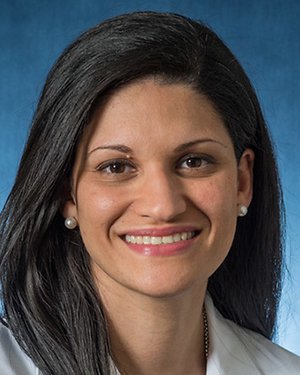Research Lab Results
-
Nada Alachkar Lab
Dr. Alachkar's research focuses on recurrent glomerular diseases post kidney transplantation. In particular, she has been studying recurrent FSGS post kidney transplant in several, partially NIH funded, prospective research projects that focuses on circulating factors associate with recurrent FSGS and new therapies of recurrent FSGS; in addition to the outcome of the disease. Also, Dr. Alachkar is the Chair of Banff recurrent GN working group that focus on the pathological changes of recurrent GN.
Dr. Alachkar's other research focus is incompatible living and diseases donor transplant. She has several ongoing research studies that focus on AMR and the outcome of patients with positive donor specific antibodies.
-
Nicole Shilkofski Lab
Work in the Nicole Shilkofski Lab aims to improve patient safety in critical care settings, with a focus on resuscitation scenarios. Our research is conducted as part of the research group of the Johns Hopkins Medical Simulation Center. We investigate the communication and functionality of teams during medical crisis situations. As part of those efforts, we are designing a web-based curriculum to teach pediatric resuscitation through mannequin simulation and computer-based simulation techniques. -
Mathioudakis Lab
The Mathioudakis lab is focused on developing and evaluating clinical decision support systems, technology, and mHealth for diabetes prevention and management. Our lab leverages large electronic medical record databases and uses machine learning algorithms and artificial intelligence to identify patterns in clinical care associated with optimal clinical outcomes. We are interested in understanding the role that advanced diabetes technologies can play in improving health outcomes for patients with diabetes. Our lab has published extensively on outcomes related to diabetes prevention and diabetes management and outcomes. Based on data from our long-term (over 10 year) clinic-based prospective cohort study from the Johns Hopkins Multidisciplinary Diabetic Foot and Wound Clinic, we have published extensively on clinical predictors and outcomes of patients with diabetic foot ulcers, focusing specifically on the role that glycemic control plays in patients with this complication. Healthcare disparities exist throughout medicine, but are particularly prominent in diabetes; our lab has evaluated healthcare inequities in diabetes outcomes and is developing and evaluating strategies to overcome them. In addition to identify optimal management approach to diabetes and its complications, our lab is interested in development and evaluation of innovative technology approaches to diabetes prevention. -
Nathaniel Comfort Lab
Research in the Nathaniel Comfort Lab looks at the history of biology. Areas of particular interest include heredity and health in 20th century America, genetics, molecular biology, biomedicine, the history of recent science, oral history and interviewing. -
Natasha Chida Lab
The Natasha Chida Lab investigates methods for using education and curriculum development to improve patient outcomes worldwide, primarily by optimizing education of physicians-in-training. Most recently, our team has worked to develop and evaluate an assessment tool for evaluating internal medicine residents’ understanding of tuberculosis diagnostics. Previous research includes a retrospective cohort study on the high proportion of extrapulmonary TB in a low-prevalence setting as well as an analysis of ways to define clinical excellence in adult infectious disease practice.
-
Neuromodulation and Advanced Therapies Center
We investigate the brain networks and neurotransmitters involved in symptoms of movement disorders, such as Parkinson's disease, and the mechanisms by which modulating these networks through electrical stimulation affects these symptoms. We are particularly interested in the mechanisms through which neuromodulation therapies like deep brain stimulation affect non-motor brain functions, such as cognitive function and mood. We use imaging of specific neurotransmitters, such as acetylcholine and dopamine, to understand the changes in brain chemistry associated with the clinical effects of deep brain stimulation and to predict which patients are likely to have changes in non-motor symptoms following DBS. Through collaborations with our neurosurgery colleagues, we explore brain function by making recordings during DBS surgery during motor and non-motor tasks. Dr. Mills collaborates with researchers in the Department of Neurosurgery, the Division of Geriatric and Neuropsychiatry in the Department of Psychiatry and Behavioral Sciences and in the Division of Nuclear Medicine within the Department of Radiology to translate neuroimaging and neurophysiology findings into clinical applications.
-
Natalie West Lab
The Natalie West Lab collaborates with Noah Lechtzin’s lab to study cystic fibrosis, with a particular focus on new resistant bacteria and their effect on the lung function of people with cystic fibrosis. -
Lisa Maragakis Lab
Researchers in the Lisa Maragakis Lab are interested in health care-acquired infections and antimicrobial-resistant Gram-negative bacilli. We are particularly interested in the epidemiology, prevention and management of these infections.
-
Lana Lee Lab
The Lana Lee Lab works to create successful patient-centered care strategies for young individuals living with HIV. We focus in particular on decision making in HIV treatment for youth and on the availability of services for young people living with HIV in the United States and Uganda.
-
Lakshmi Santhanam Lab
Investigators in the Lakshmi Santhanam Lab examine the fundamental mechanisms behind cardiovascular disease. They are particularly interested in better understanding how nitric oxide-mediated S-nitrosylation (a post-translational protein modification) impacts protein function and trafficking in the vasculature as well as how this relationship influences matrix remodeling and vascular stiffening.



